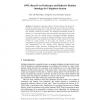Free Online Productivity Tools
i2Speak
i2Symbol
i2OCR
iTex2Img
iWeb2Print
iWeb2Shot
i2Type
iPdf2Split
iPdf2Merge
i2Bopomofo
i2Arabic
i2Style
i2Image
i2PDF
iLatex2Rtf
Sci2ools
116
click to vote
OTM
2005
Springer
2005
Springer
OWL-Based User Preference and Behavior Routine Ontology for Ubiquitous System
In ubiquitous computing, behavior routine learning is the process of mining the context-aware data to find interesting rules on the user’s behavior, while preference learning tries to utilize the user’s behavior information to infer user interests, intention and desires. An intelligent environment should be adaptive, i.e. it is should be able to learn the routine and preference of user, then provide user with the suitable service. Developing intelligent ubiquitous environment requires not only good learning algorithms but also appropriate reusable models of user preference and behavior routine, which are not fully covered by current projects. In this paper, we propose a formal and comprehensive ontology-based model of user preference and behavior routine. The implementation of the ontology using OWL[14] enhances the expressiveness, support inference, knowledge reuse and knowledge sharing, which we can not achieve by normal models. The main benefit of this model is the ability to re...
| Added | 28 Jun 2010 |
| Updated | 28 Jun 2010 |
| Type | Conference |
| Year | 2005 |
| Where | OTM |
| Authors | Kim Anh Pham Ngoc, Young-Koo Lee, Sungyoung Lee |
Comments (0)

